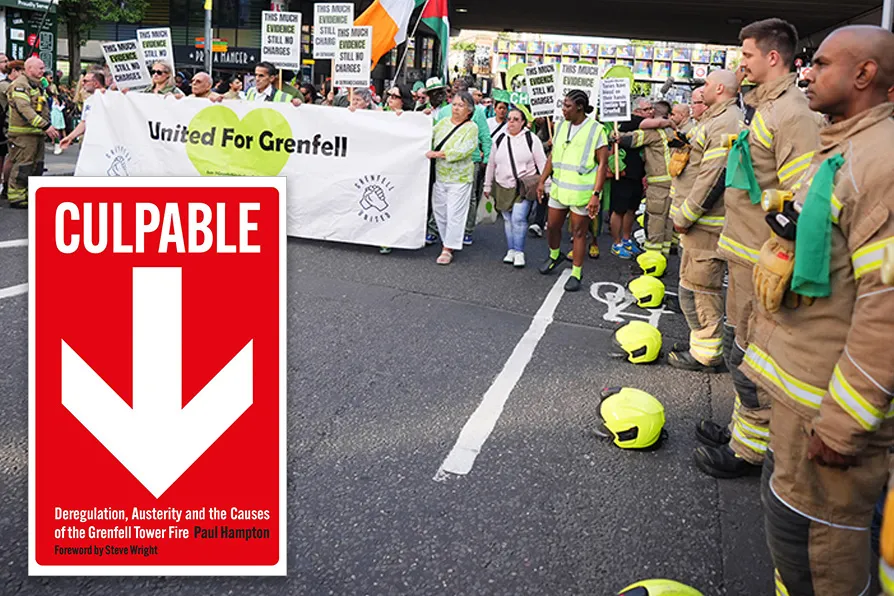RITA DI SANTO draws attention to a new film that features Ken Loach and Jeremy Corbyn, and their personal experience of media misrepresentation
MARJORIE MAYO is moved by the clarity with which the FBU call out the true causes of this preventable tragedy

 DIGNITY AND TRUTH: Firefighters line the street as people take part in a silent march in west London in memory of those killed in the Grenfell Tower disaster, on the eighth anniversary of the fire, June 14, 2025.
DIGNITY AND TRUTH: Firefighters line the street as people take part in a silent march in west London in memory of those killed in the Grenfell Tower disaster, on the eighth anniversary of the fire, June 14, 2025.
Culpable
Paul Hampton, Pluto Press, £19.99
AS Fire Brigades Union (FBU) general secretary Steve Wright points out in his introduction, the Grenfell Tower fire was a preventable tragedy, leading to the loss of 72 lives. And a whole community has been facing loss and trauma, displacement and devastation ever since.
The FBU, which represents the vast majority of firefighters, produced this book as a record of the union’s efforts to challenge deregulation, efforts that have dated back over a number of decades. The book will be used to educate FBU members and the wider public, more generally.
Culpable focuses on the underlying structural causes of this disaster along with the FBU’s interventions to uphold public safety. Hampton provides detailed accounts of the Thatcher government’s launch of deregulation as part of the drive to promote profits and profitability, cutting regulations and red-tape — including building safety regulations and fire safety in the process. These policies set the framework for subsequent (including New Labour) interventions — with literally lethal consequences.
There were inevitably conflicts of interest as a result of deregulation and part privatisation. The Construction Industry Council was enabled to designate individuals to gain approved inspector status: for example, powers that were subsequently increased to include corporations under New Labour, with its continuation of previous policies under the guise of “better regulation.” So the building industry could effectively “mark its own homework.”
Under the coalition government and subsequent Conservative governments these processes of deregulation and privatization were accelerated further, and the fire and rescue services experienced continuing rounds of austerity cuts. The London Fire Brigade’s firefighting force was reduced from 7,234 in 2008 to 5,584 by 2017, the year of the Grenfell fire, for instance.
Unsurprisingly, unscrupulous operators took advantage of the inadequacies of public safety control mechanisms, using cladding materials that were known to be hazardous, for example. And the local authority (the Royal Borough of Kensington and Chelsea) and their arm’s-length management organisation ignored residents’ concerns about safety in response. The result was a disaster waiting to happen.
Hampton documents the FBU’s repeated attempts to raise these issues over past decades, the underlying structural causes as well as the more immediate causes, such as the hazardous materials used in the botched refurbishment of the tower. Given these failures, the policy that residents in high-rise buildings should stay put, in the event of a fire, proved to be tragically flawed. The fire could simply not be contained within one floor, as this policy assumed.
Lawyers at the inquiry tried to cast blame on the London Fire Brigade for not attempting to evacuate everyone earlier. But Hampton explains the difficulties in attempting to do this, especially given that firefighters had not received training for mass evacuations in such circumstances. As it was, Hampton points to the incredible bravery of the firefighters who did still succeed in rescuing so many residents — and to their continuing support for Justice for Grenfell, subsequently.
Despite the campaign’s efforts, though, justice continues to be delayed. No trials are expected before 2027. Those culpable are still to be called to account.
This disaster was not the result of well-intentioned people making mistakes, as Tony Blair suggested when the report was published. Rather, as Matt Wrack responded, on behalf of the FBU, the Grenfell fire was the result of “a systematic disregard for the safety of residents — and the prioritisation of private profit over human life.” As the book concludes, “the multimillion-pound mansions of Notting Hill are only a short walk from what remains of Grenfell Tower. The contrasts between wealth and poverty — power and exploitation — are class issues that cannot be avoided.”
Morning Star readers will find so much of interest here — whether they choose to immerse themselves in so much detail — or not. The FBU’s account of the death and destruction that has been wreaked by neoliberalism remains only too relevant.










